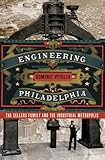Engineering Philadelphia : The Sellers Family and the Industrial Metropolis / Domenic Vitiello.
Material type: TextPublisher: Ithaca, NY : Cornell University Press, [2014]Copyright date: ©2014Description: 1 online resource (288 p.) : 27 halftonesContent type:
TextPublisher: Ithaca, NY : Cornell University Press, [2014]Copyright date: ©2014Description: 1 online resource (288 p.) : 27 halftonesContent type: - 9780801450112
- 9780801469749
- Deindustrialization -- History -- 20th century -- Pennsylvania -- Philadelphia
- Deindustrialization -- Pennsylvania -- Philadelphia -- History -- 20th century
- Industrialization -- History -- 19th century -- Pennsylvania -- Philadelphia
- Industrialization -- Pennsylvania -- Philadelphia -- History -- 19th century
- Manufactures -- History -- 19th century -- Pennsylvania -- Philadelphia
- Manufactures -- Pennsylvania -- Philadelphia -- History -- 19th century
- Urbanization -- History -- 19th century -- Pennsylvania -- Philadelphia
- Urbanization -- Pennsylvania -- Philadelphia -- History -- 19th century
- Biography & Autobiography
- General Economics
- U.S. History
- HISTORY / United States / State & Local / Middle Atlantic (DC, DE, MD, NJ, NY, PA)
- 974.811 23
- F158.44 .V64 2016
- online - DeGruyter
- Issued also in print.
| Item type | Current library | Call number | URL | Status | Notes | Barcode | |
|---|---|---|---|---|---|---|---|
 eBook
eBook
|
Biblioteca "Angelicum" Pont. Univ. S.Tommaso d'Aquino Nuvola online | online - DeGruyter (Browse shelf(Opens below)) | Online access | Not for loan (Accesso limitato) | Accesso per gli utenti autorizzati / Access for authorized users | (dgr)9780801469749 |
Browsing Biblioteca "Angelicum" Pont. Univ. S.Tommaso d'Aquino shelves, Shelving location: Nuvola online Close shelf browser (Hides shelf browser)
Frontmatter -- Contents -- List of Illustrations -- Preface -- Introduction -- 1. Manufacturing Metropolitan Development -- 2. Migration Strategies and Industrial Frontiers -- 3. Rationalizing the Factory and City -- 4. Progressive Economic Development -- 5. Empires of Steel -- 6. Building the Scientific City -- 7. Roots of Decline -- Notes -- Index
restricted access online access with authorization star
http://purl.org/coar/access_right/c_16ec
The Sellers brothers, Samuel and George, came to North America in 1682 as part of the Quaker migration to William Penn's new province on the shores of the Delaware River. Across more than two centuries, the Sellers family-especially Samuel's descendants Nathan, Escol, Coleman, and William-rose to prominence as manufacturers, engineers, social reformers, and urban and suburban developers, transforming Philadelphia into a center of industry and culture. They led a host of civic institutions including the Franklin Institute, Abolition Society, and University of Pennsylvania. At the same time, their vast network of relatives and associates became a leading force in the rise of American industry in Ohio, Georgia, Tennessee, New York, and elsewhere.Engineering Philadelphia is a sweeping account of enterprise and ingenuity, economic development and urban planning, and the rise and fall of Philadelphia as an industrial metropolis. Domenic Vitiello tells the story of the influential Sellers family, placing their experiences in the broader context of industrialization and urbanization in the United States from the colonial era through World War II. The story of the Sellers family illustrates how family and business networks shaped the social, financial, and technological processes of industrial capitalism. As Vitiello documents, the Sellers family and their network profoundly influenced corporate and federal technology policy, manufacturing practice, infrastructure and building construction, and metropolitan development. Vitiello also links the family's declining fortunes to the deindustrialization of Philadelphia-and the nation-over the course of the twentieth century.
Issued also in print.
Mode of access: Internet via World Wide Web.
In English.
Description based on online resource; title from PDF title page (publisher's Web site, viewed 02. Mrz 2022)









